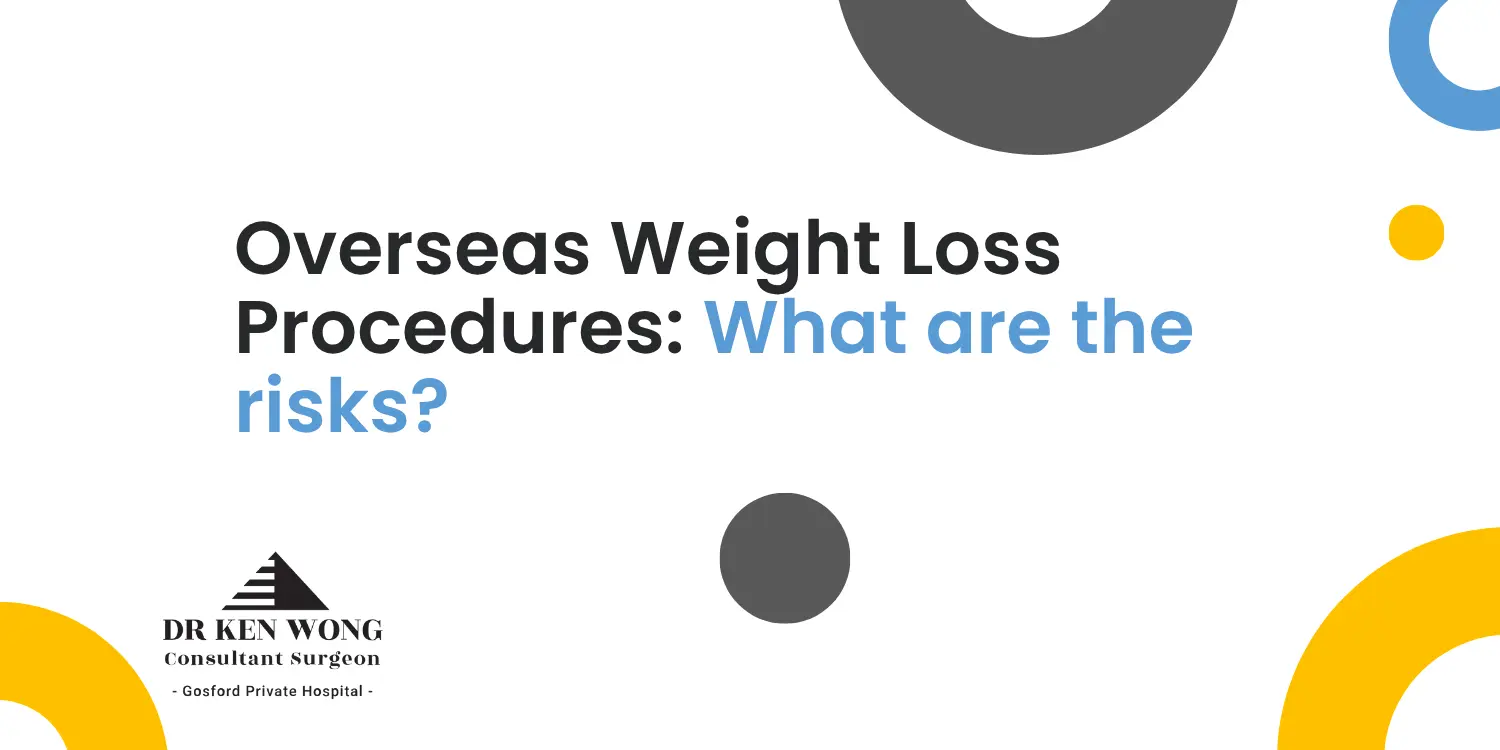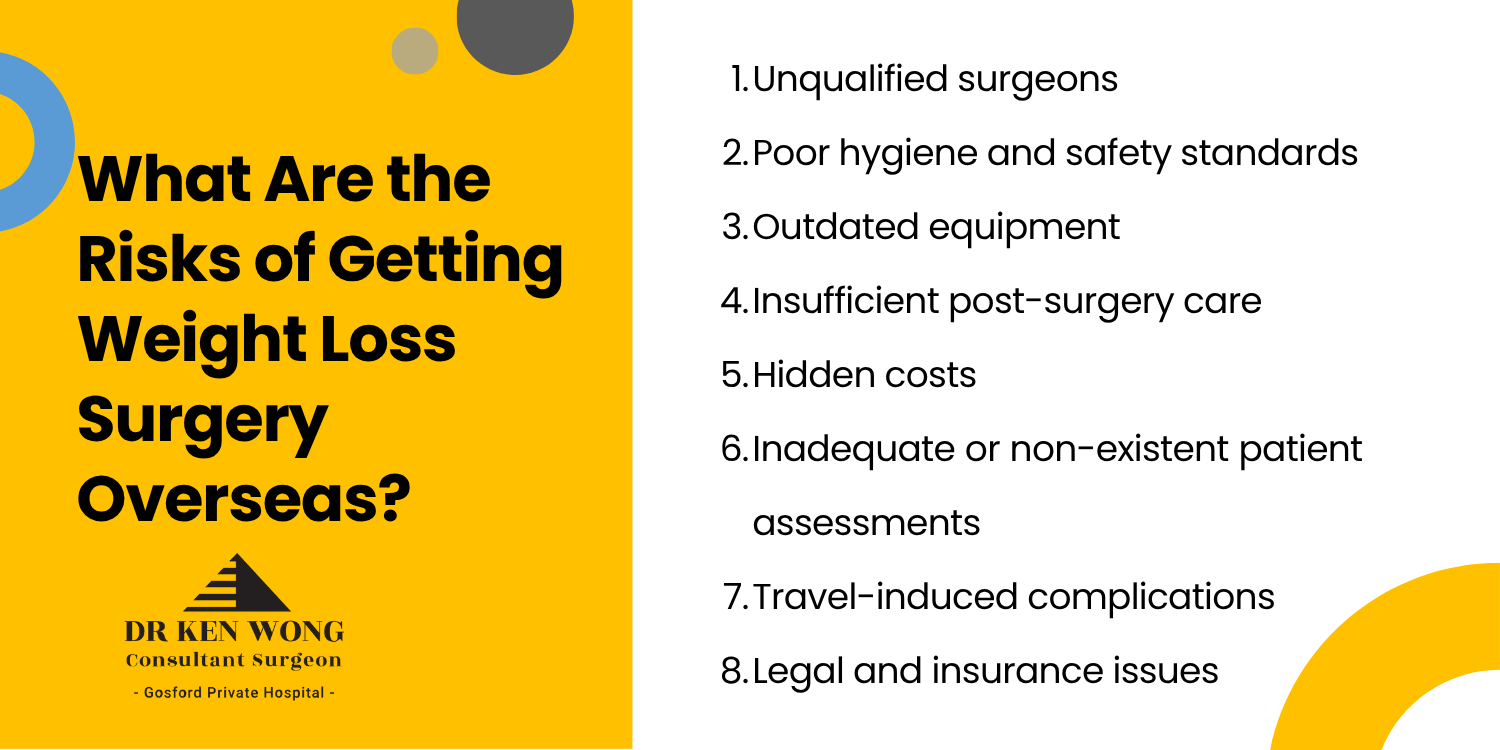
If you are contemplating weight loss surgery, perhaps you’ve considered having your operation overseas rather than here in Australia. While procedures abroad can be tempting due to lower costs and shorter wait times, a major weight loss procedure in a foreign country comes with serious risks which need to be taken into account.
Australia’s medical standards are among the best in the world for safety and competence. And this is not the case in every country. When bariatric surgery is not performed to the highest standards, complications like infections, blood clots, and hernias can occur. Treating these complications can be expensive, and in some cases, fatal.
Statistics from the British Association of Aesthetic Plastic Surgeons (BAAPS) say that 50% of patients regretted going abroad for their procedures and there has been a 78% increase in patients needing corrective surgery once they got home.
If you are considering having a weight loss procedure overseas, here are some of the biggest risks and complications that you should be aware of.
1. Unqualified Surgeons
In Australia, all bariatric surgeons must be registered under the Medical Board of Australia to prove that they meet mandatory medical standards and are qualified to work with patients.
This level of regulation does not exist in many countries across the world, which means you may be dealing with an unqualified surgeon or anaesthetist. Always do your research into the people who would be performing your surgery to determine whether they have the necessary education, skills, experience, and safety processes to safely carry out the procedure.
Special care should be taken with flashy social media ads for fast fix surgery packages. As a rule of thumb, if it seems too good to be true, it probably is.
2. Poor Hygiene and Safety Standards
All Australian hospitals have to be accredited by the government to prove a high quality of healthcare, hygiene, and safety standards.
Overseas hospitals may not be regularly inspected for hygiene and safety and sub-par facilities will put you at a higher risk of infection and complications.
3. Outdated Equipment
Some overseas surgeries may cut corners and use outdated or low-quality surgical equipment. Again, we have strict stands in Australia. Using outdated tools may not work correctly and be harder to sterilise, which can cause contamination or infection.
4. Insufficient Post-Surgery Care
For weight loss surgery to be successful, patients need quality post-surgery care and guidance. Bariatric surgeons in Australia conduct regular follow-ups with patients and work with dieticians, exercise specialists, and psychologists to ensure the best weight loss results after their operation.
Many overseas surgery providers don’t provide follow-up appointments which means complications could slip under the radar and the patient’s weight loss progress could be affected.
5. Hidden Costs
While overseas weight loss surgery may seem appealing due to lower upfront costs, often once you factor in travel, accommodation, insurance, and emergency medical bills if things go wrong, the total ends up being much higher.
6. Inadequate or Non-Existent Patient Assessments
Not everyone is suitable for weight loss surgery and you need to be evaluated to determine your risk level. Weight loss surgery can be a major operation with lengthy recovery times, so it should not be a quick alternative to having a healthy diet and active lifestyle.
In Australia, patients must have a psychological assessment and at least two face-to-face pre-operative consultations. Australian surgeons will only perform weight loss surgery if it is deemed safe to do so, you are morbidly obese, and are at a high risk of developing life threatening health problems because of your weight.
A lot of the time, overseas surgery providers will agree to a surgery without conducting the necessary health assessments or medical history checks.
7. Travel-Induced Complications
Flying too soon after bariatric surgery is not recommended because it takes up to six weeks for your body to fully heal. This combined with air pressure could put you at a higher risk of developing blood clots and infections.
8. Legal and insurance issues
Differing legal systems between countries can make it difficult and expensive to obtain compensation should anything go wrong with your surgery.
What’s more, Medicare and standard travel insurance policies won’t cover elective procedures performed overseas. You’ll need to make sure you get a specialised travel insurance policy to make sure you’re covered should anything go wrong. Which, again, can be expensive.

How to Get Weight Loss Surgery in Australia?
If you are considering weight loss surgery, you should speak to a fully-qualified healthcare professional to ensure your procedure is carried out safely and with successful results.
Dr Ken Wong specialises in keyhole weight loss surgeries, including lap bands, gastric banding, sleeve, gastrectomy, gastric bypass, and gastric band removal or revision.
To discuss your options for weight loss surgery, whether you are eligible, or to book a consultation at Central Coast Surgery in Newcastle, contact us using the form on this page or call (02) 4323 7000.
